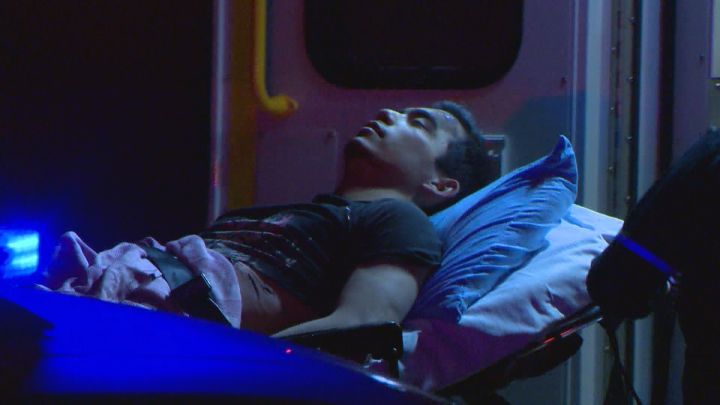DISTURBING CONTENT: This story contains descriptions of graphic violence. Discretion is strongly advised.

An expert psychologist from the Alberta Hospital Edmonton who helped evaluate Matthew de Grood became the third doctor to suggest de Grood fits the criteria for a not criminally responsible (NCR) defence as he testified Thursday in the Brentwood murder trial.
Scroll down to read our live blog recap from reporter Nancy Hixt
NCR applies to those who are found to have committed an act that constitutes an offence, but cannot appreciate or understand what they did was wrong due to a mental disorder at the time.
READ MORE: Matthew de Grood told psychiatrist a voice said ‘kill them before they get you’
“At the time of the events, my client suffered from a disease of the mind,” defence lawyer Allan Fay said after court adjourned. “He was psychotic—probably schizophrenic—and as a result of this mental illness, he was incapable of understanding what he was doing. He believed he was acting in self-defence. He believed at the time he was about to be killed himself, and his only alternative was to defend himself.”
SPECIAL COVERAGE: Remembering the Brentwood 5
Zackariah Rathwell, 21, Jordan Segura, 22, Josh Hunter, 23, Kaitlin Perras, 23, and Lawrence Hong, 27, were stabbed to death at a house party in Brentwood on April 15, 2014.
De Grood pleaded not guilty to five counts of first-degree murder Monday. An agreed statement of facts was entered Monday, in which 24-year-old de Grood admitted to stabbing each of the five victims with a kitchen knife.
Watch below: Global’s ongoing coverage of the trial of Matthew de Grood
Psychologist Dr. Andrew Haag said Thursday de Grood was ordered by the court to undergo a psychological assessment at the hospital. Haag said he spent hours with the accused, going over police records, witness statements, audio files and text messages. He also interviewed de Grood’s parents.

Get daily National news
“He did suffer from a disease of the mind” at the time of the killing, Haag told court.
“At the time of the index offences, my professional opinion is that he likely suffered from schizophrenia.”
Haag said de Grood’s symptoms were “reasonably well-managed” when he was assessed, making it “difficult to know if he was faking.” However, after his interviews he concluded the mental illness was real.
“I believe he had a legitimate psychotic disorder.”
READ MORE – ‘I did what I had to do’: Matthew de Grood pleads not guilty in Brentwood mass murder
Haag said during treatment, de Grood has taken a variety of anti-psychotic medications. The psychologist said he continued to show symptoms of mental illness in the months after the killings, but “not as intense.”
When the Crown asked whether de Grood may have been faking illness or planned the killings, Haag said it was “very unlikely” and cited his education and Internet search history.
He explained the remorse de Grood expressed to police after the killings is an indication he understood “what he did as opposed to the moral wrongness of what he did.”
Crown prosecutor Neil Wiberg said his cross-examination was used to address the issue of faking mental illness.
“That’s very elementary for someone to think, ‘gee maybe he’s faking this whole thing,’ so that was the purpose of the cross examination…to cover every inch that they considered faking.”
Read below: The last two pages of Dr. Andrew Haag’s psychological report of de Grood, detailing the “evaluation of criminal responsibility” in the Brentwood murders
Two expert forensic psychiatrists testified Wednesday after the Crown closed its case. One said he was “clearly psychotic” when he stabbed and killed five people in Calgary’s worst mass murder; the second agreed and diagnosed him with schizophrenia.
Haag estimated he’s done about 100 assessments focusing on criminal responsibility in the past.
“For the majority of cases I assess, not criminally responsible does not apply,” he said.
The psychologist said if someone was faking, the last thing he would expect was for the accused to underreport symptoms, which is something he said de Grood did in testing.
“I am very reasonably confident that he was psychotic at the time.”
READ MORE: Families of victims read tributes in trial of Matthew de Grood, accused in Brentwood murders
Fay recognized that the public following the trial may not believe in the legitimacy of the NCR defence.
“I believe many members of the public feel that the defence of not criminally responsible is a sham or a scam that people use to escape criminal liability,” he said. “And, as you heard from the expert witnesses that were called, these things are live in the minds of the experts when they do these assessments.”
Wiberg declined to say whether he would pursue a high-risk NCR designation, saying he would wait for the decision.
“Everybody is a loser in this particular case. Five outstanding people were killed and nothing, no decision will get around that.”
All evidence in the trial was presented as of Thursday afternoon. Court was adjourned until Tuesday for closing arguments.
If de Grood is found NCR, Fay said he will be sent to a secure psychiatric facility, such as the Alberta Hospital Edmonton or the Southern Alberta Forensic Psychiatry Centre.
“He will be detained there, subject to a review by the Alberta Review Board, and he will remain there until such time as the Alberta Review Board feels that any risk that exists can be successfully managed in the community.”
Fay said this could take “months, years, maybe the rest of his life.”
LIVE BLOG RECAP: Reporter Nancy Hixt has been tweeting the details of the trial live from the Calgary Courts Centre all week.








Comments